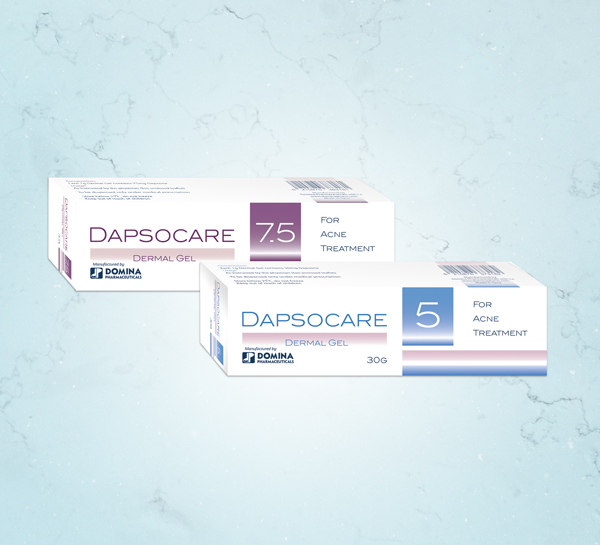
Composition:
Each 1g Gel contains 50 or 75 mg Dapsone.
Mechanism of action:
The anti-inflammatory properties of dapsone result from inhibition of granulocyte cytotoxicity, via inhibition of peroxidases and scavenging of reactive oxygen species. The antimicrobial properties of dapsone result from competitive inhibition of dihydropteroate synthase, a bacterial enzyme necessary for synthesis of folic acid.
The mechanism of action of dapsone gel in treating acne vulgaris is not known, it has been suggested that it may act as an immunomodulator.
Pharmacokinetics:
Steady state for dapsone was reached within 7 days of dosing for both treatment groups. The systemic exposure from dapsone gel is expected to be about 1% of that from a 100 mg oral dose.
Indications:
It is used for topical treatment of acne vulgaris.
Dosage and Administration:
This gel should only be applied to affected areas. For external use only. Not for oral, ophthalmic or intravaginal use. Not for use on broken skin. If contact with eyes occurs, rinse thoroughly with water.
• Dapsone 5% Gel::Apply approximately a pea-sized amount of Gel, 5%, in a thin layer to the acne affected areas twice daily.
• Dapsone 7.5% Gel::approximately a pea-sized amount of 7.5% gel, should be applied in a thin layer to the entire face once daily. In addition, a thin layer may be applied to other affected areas once daily.
Reassess appropriateness of dapsone therapy if no improvement after 12 weeks.
Side effects:
Most adverse drug reactions were mild in severity: site Dryness, site Pruritus, and site Pain, Oiliness/Peeling, Erythema
Contraindications:
- Hypersensitivity to any of its components.
- Individuals with congenital or idiopathic methaemoglobinaemia.
Drug and Food Interactions:
Trimethoprim-Sulfamethoxazole:
During co-administration, systemic levels of TMP and SMX were essentially unchanged, however, levels of dapsone and its metabolites increased.
Topical Benzoyl Peroxide:
Topical application of dapsone gel followed by benzoyl peroxide in patients with acne vulgaris may result in a temporary local yellow or orange discolouration of the skin and facial hair.
Concomitant Use with Drugs that Induce Methaemoglobinaemia:
Such as: sulfonamides, acetaminophen, acetanilide, benzocaine, chloroquine and naphthalene may increase the risk for developing methaemoglobinaemia
Warnings:
- Cases of methemoglobinemia, with resultant hospitalization, have been reported postmarketing in association with Dapsocare treatment.
- Dapsone can cause elevated methemoglobin levels particularly in conjunction with methemoglobin inducing agents.
- Peripheral neuropathy (motor loss and muscle weakness) has been reported with oral dapsone treatment.
- Skin reactions (toxic epidermal necrolysis, erythema multiforme, morbilliform and scarlatiniform reactions, bullous and exfoliative dermatitis, erythema nodosum, and urticaria) have been reported with oral dapsone treatment. These types of skin reactions were not observed in clinical trials with topical Dapsocare treatment.
- Dapsocare should be discontinued if signs and symptoms suggestive of haemolytic anaemia occur.
- Avoid use of dapsone gel in patients who are taking oral dapsone or antimalarial medications because of the potential for haemolytic reactions.
- Dapsocare should be avoided in those patients with congenital or idiopathic methaemoglobinaemia.
- The combination of topical dapsone with trimethoprim/sulfamethoxazole (TMP/SMX) may increase the likelihood of haemolysis in patients with G6PD deficiency.
- If contact with eyes occurs, rinse thoroughly with water.
- Patients should be instructed to wash their hands after application.
Use in pregnancy or lactation:
Pregnancy: Use in pregnancy is not recommended.
Lactation: Dapsone is excreted in human milk. Because of the potential for oral dapsone to cause adverse reactions in nursing infants, a decision should be made whether to discontinue nursing or to discontinue the gel taking into account the importance of the drug to the mother.